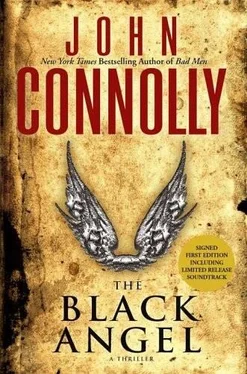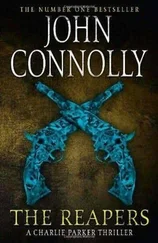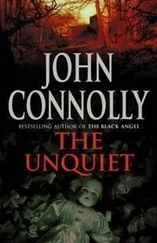“Where are they taking him?” said Ellen.
“It doesn’t matter.”
“Will he be back?”
“No.”
She looked distraught.
“What am I gonna do without him? I got no money, no place to go.”
Her teeth worried at her lower lip. I thought she was about to cry.
“Your name is Jennifer Fleming,” I said. “You come from Spokane, and you’re seventeen years old. Your mother reported you missing six months ago. Her boyfriend has since been charged with assault, possession of a controlled substance with intent to supply, and sexual abuse of a minor based upon photographs found in the apartment he shared with your mom. The photographs were dated. You were fifteen when they were taken. Your mom claims that she didn’t know it was going on. Is that true?’
Jennifer was crying. She nodded.
“You don’t have to go home yet, if you don’t want to. I know a woman who runs a shelter upstate. It’s pretty, and you’ll have some time to think. You’ll have your own room, and there are green fields and woods to walk in. If you like, your mom can come visit you, and you can talk about stuff, but you don’t have to see her until you’re ready.”
I didn’t know what to expect from her. She could have walked away and found shelter with some of the older women. After all, she had no reason to trust me. Men like G-Mack and Poppa Bobby had probably offered her protection too, and extracted a heavy price in return.
But she didn’t walk away. She dried her tears with the back of her hand, and suddenly she was just a lost girl. The woman she had been forced to become disappeared entirely, and the child that she still was took her place.
“Can we go now?” she said
“Yes, we can go now.”
Her eyes moved sideways, looking past me. I turned to see two men approaching. One was skinny and black, with gold chains at his wrist and neck. The other was a fat white man wearing a red padded jacket and worn sneakers.
“Fuck you doing?” said the white guy. “Where’s Bobby at?”
“Look over your shoulder,” I said.
“What?”
“You heard me: look over your shoulder.”
He did. It was a quick movement, like a dog snapping at a fly. Over by the subway, barely ten feet from us, Angel stood watching us. Louis was just rejoining him. He dropped something into a trash can as he walked. It looked like a Dodgers cap.
Angel waved. Tubby tapped his buddy on the shoulder, and the small black man turned to see what the problem was.
“Shit,” he said.
“If you don’t walk away now, those men will kill you.”
They exchanged a look.
“I never did like Bobby anyway,” said the white guy.
“Who’s Bobby?” said the black guy.
They walked away, and I left with Jennifer, Angel and Louis staying with us until we had retrieved my car from the parking garage. We drove northwest beneath starless skies. Jennifer slept for part of the journey, then found a station that she liked on the radio. Emmylou Harris was singing Lennon and McCartney’s “Here, There and Everywhere,” one of those cover versions that most people have never heard but that most people should.
“Is this okay?” she said.
“It’s fine.”
“I like the Beatles. Their version is better, but this is good too. It’s sadder.”
“Sometimes sad is good.”
“Are you married?” she asked suddenly.
“No.”
“Got a girlfriend?”
I wasn’t sure how to answer.
“I used to, but not any more. I have a little girl, though. I had another daughter once, but she died. Her name was Jennifer too.”
“Was that why you came back for me, because we have the same name?”
“If it was, would that be enough?”
“I guess. What will happen to Poppa Bobby?”
I didn’t answer.
“Oh,” she said, and she said nothing else for a time. Then: “I was there, y’know, the night G-Mack got killed. That wasn’t his real name. His real name was Tyrone.”
We were driving along the highway now, away from the interstate. There was little traffic. Ahead of us, red lights ascended into the air like fireflies as a distant car scaled a dark, unseen hill.
“I didn’t see the man who killed him,” she said. “I left before the police came. I didn’t want any trouble. They found me, though, and they asked me about that night, but I told them that I wasn’t with him when he died.”
She stared out the window. Her face was reflected in the glass.
“I can keep a secret, is what I’m saying,” she said. “I won’t tell. I didn’t see the man who killed Tyrone, but I heard what he said before he pulled the trigger.”
She didn’t turn her face away from the glass.
“I won’t tell anyone else,” she said. “Just so you know, I won’t ever tell another soul.”
“What did he say?” I asked.
“He said, ‘She was blood to me…’”
There are still boxes in the hallway and clothes on the chairs. Some of them are Rachel’s, some are Sam’s. They buried Ellis Chambers’s son Neil today, but I did not attend the funeral. We save those whom we can save. That is what I tell myself.
The house is so very quiet.
Earlier, I walked down to the seashore. The wind was coming from the east, but I felt a warm breeze on my face when I looked inland, and I heard voices whisper to me in passing as the sea called to them, welcoming them into its depths, and I closed my eyes and let them wash over me, their touch like silk upon me and their grace momentarily resonating in some deep part of me before it dissipated and was gone. I looked up, but there were no stars, no moon, no light.
And in the darkness beyond night, Brightwell waits.
I have been sleeping, seated in a wicker chair on the gallery, wrapped in a blanket. Despite the cold, I do not want to be inside, lying in the bed where, so recently, she too once lay, looking at the empty reminders of our life together. Now something has awoken me. The house is no longer silent. There is a creak from a kitchen chair. A door closes. I hear what might be footsteps, and the laughter of a child.
We told you that she would go away.
It was my decision. I will add no more names to the palimpsest of the heart. I will make reparation, and I will be forgiven my sins.
The wind chime in the hallway casts its song into the still, dark night, and I feel a presence approach.
But we will never leave.
All is well, all is well.
Much of the historical detail is this novel is based on fact, and the monasteries mentioned are all real. In particular, the ossuary at Sedlec is much as I have described it, although far more impressive visually than I could convey in words. Anyone interested can pay a virtual visit through my website (www.johnconnolly.co.uk) but if you are lucky enough to find yourself in the Czech Republic, then Sedlec is worth a trip. I would like to express my thanks to the staff at the ossuary, to Vladimira Saiverova at the Philip Morris company (which now owns the monastery at Sedlec), and to my Czech guide Marcela Krskova for their kindness and assistance in researching the Sedlec sections of this book. I am also grateful to the wonderful Luis Urrea, author of The Devil’s Highway, for his help with matters of translation. As always, any mistakes are my fault, not theirs.
Finally, I would like to thank Sue Fletcher, my editor at Hodder amp; Stoughton, and Emily Bestler, my editor at Atria, for their kindness, advice, and support. Thanks also to Swati Gamble, Kerry Hood, Lucy Hale, Sarah Branham, Jodi Lipper, Audra Boltion, Judith Curr, Louise Burke, Karen Mender, Justin Loeber, and all the staff at both publishing houses who have done so much for my books; to Chuck Antony; to Darley Anderson and his staff, for looking out for me; to Heidi Mack, my wonderful web maven; to Megan Underwood, my lovely publicist; to my mother and Brian; and to Jennie, Cameron, and Alistair for, well, you know…
Читать дальше












